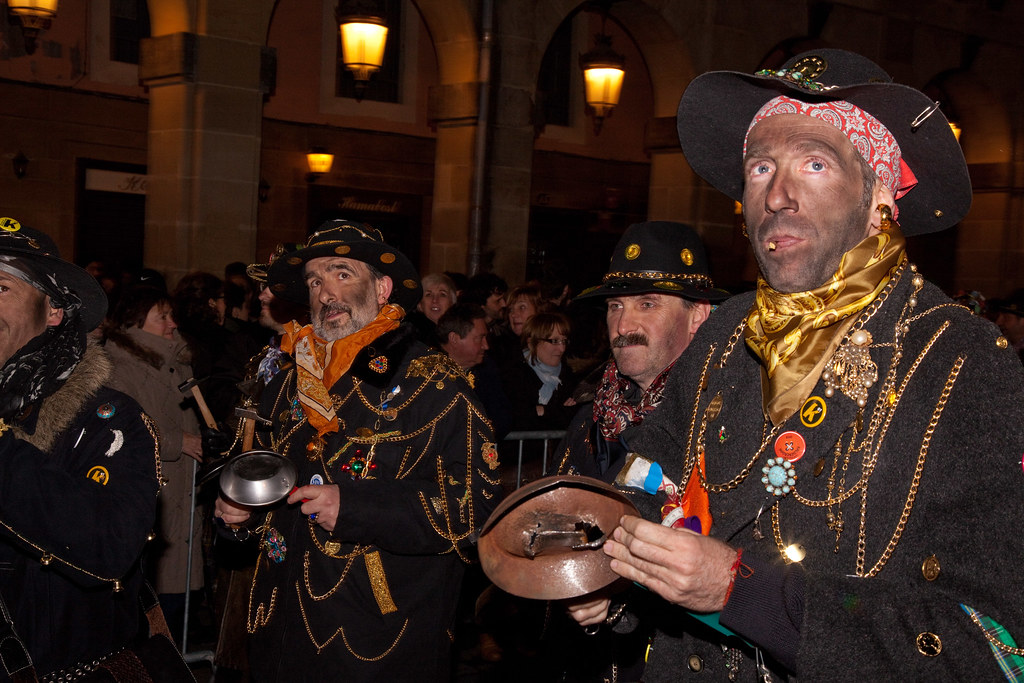Who would spy on the police?
Lately the Basque Government is making a special effort to erase the past of the Ertzaintza and present the face clean. The marquesinas are found each year loaded with advertisements to be ertzainas, and young people are presented as an interesting professional option the police in the face of an unstable and precarious work context, with good and lasting economic conditions. According to the Basque Country Security Advisor, Josu Erkoreka, in the last five years 2,651 police seats have been offered. It seems that it is also succeeding. And that is that, in precarious and juvenile contexts, it is increasingly common to know that some member of the area is in the formation of Arkaute.
In our society it is taken as if the institution of the police were eternal. Despite the existence of societies without any form of formal police force and the existence of several societies full of police and with high rates of crime and inequality, this approach implies thinking that the police is necessary and without it there would only be chaos. Thus, they insist that the Police is an essential organization to ensure the security and well-being of citizens, normalizing police action.
But we cannot forget the role of the police: to use the monopoly of violence given to it by the state to maintain the status quo of society
To this end, the Basque Government is putting more and more powers in charge: gender violence, maritime rescue... and social education for children and young people is also promoting law enforcement bodies without any kind of cover-up; they send our armed centres in uniform to conduct workshops on social conflicts arising from machismo, racism and precariousness. After that, the objective of whitening the image of the police and controlling the discourses of society is clear.
However, we must not forget the police role: to use the monopoly of violence given by the state to maintain the status quo of society. Therefore, the very existence of the police makes the police use violence. History has shown us that the police are prepared to use the necessary resources to maintain the social order that Governments consider appropriate and to reach any place, as well as the Ertzaintza, although some political sectors have sought to differentiate themselves from this category.
The massive expansion of cameras and social networks has multiplied the Police's ability to spy on any citizen
Today they have renewed tools to achieve the goals we always have: we live in the era of bureaucracy and social control surrounded by new technologies. On the one hand, police officers enjoy administrative protection for the identification, detention and punishment of citizens for repressive purposes. Thus, bureaucracy is an effective instrument to intimidate a person/group that can potentially generate any kind of discomfort or conflict under the excuse of law enforcement, which criminalizes social and political conflicts. Moreover, by paying large amounts, people and groups with lower socioeconomic resources are the most disadvantaged. A clear example of this is the Spanish State Mordaza Law and the Mozal Municipal Ordinance, currently in force, which have decided not to repeal.
On the other hand, new technologies have been a major change in the Police ' s regular practice. The massive expansion of cameras and social networks has multiplied the police's ability to spy on any citizen. You can find cameras on the streets. Now, in addition, some are smart and several cops carry the camera in the uniform (body-cam). Just as it is very intrusive for citizens, this allows anyone to be recorded at any time and place and thus potentially spied. The uncertainty it causes is another way for the police to maintain power.
The types of violence that seem more “soft” do not replace explicit violence, but expand police capacity
Analyzing these new instruments, it seems that police action has changed, but if so decided, they always have access to explicit violence. That is, the types of violence that appear to be more “soft” do not replace explicit violence, but expand the capacity of the police to act. Thus, we see that police forces continue to carry out with impunity explorations, arrests, ill-treatment or infiltrations in popular movements that are considered practices of another era. An example of this is the repression of the COVID-19 era; the massacre of a young man broken by a step behind the order “we will throw to give”, heard in the Old Part of San Sebastian; the infiltrations known in recent months in the popular movements of Catalonia, Valencia and Madrid; the police assembly against the occupied neighborhood of Hell of San Sebastian; the proportionality of the use of the complementary police part
We have not forgotten the systematic arrests, ill-treatment, thousands of torture and murders committed in our country. Without forgetting the past, it is important to pay attention to what is happening today. We know that there is multiple violence at the hands of the police, but when? How? How many times? Who is in the police's sights? Who is the enemy of the state?
We want to use this space to know and publicly denounce the current police violence.
Faced with this situation, a year ago we began to meet under the name of TXAGO to keep a record of the current state violence in Donostialdea. Intensive work has been done to study the various violence suffered in recent decades by the Spanish State, the French State and the Basque institutions, to work with the social consequences that this has produced and to dignify the lives of those affected. After several group reflections, we have limited our work to specific areas:
1. We will record police harassment through testimonies, observation and documentation.
2. We do not currently have the capacity for legal monitoring, so we will not be able to work together on this matter at the moment.
3. Despite the lack of resources for therapeutic follow-up, we are willing to collaborate in the psychosocial care and follow-up of the people or groups involved.
We want to use this space to know and publicly denounce the current police violence. If you want to know more about the project and learn about other experiences, on April 22 we will be at Txerrimuño de Lezo!
Leire García Fernández, member of the Txago Gipuzkoa project
Contact us at txagogipuzkoa@riseup.net
*This text refers to the reality of the CAPV, because we have located the project in Donostialdea. However, we know that in Euskal Herria there are more police forces that use violence: the Navarra Foral Police, the French National Gendarmerie, the Civil Guard and the Spanish National Police.
Bidali zure iritzi artikuluak iritzia@argia.eus helbide elektronikora
ARGIAk ez du zertan bat etorri artikuluen edukiarekin. Idatzien gehienezko luzera 4.500 karakterekoa da (espazioak barne). Idazkera aldetik gutxieneko zuzentasun bat beharrezkoa da: batetik, ARGIAk ezin du hartu zuzenketa sakona egiteko lanik; bestetik, egitekotan edukia nahi gabe aldatzeko arriskua dago. ARGIAk azaleko zuzenketak edo moldaketak egingo dizkie artikuluei, behar izanez gero.
Sare Herritarrak antolatuta, pasa den urtarrilaren 11n Bilboko kaleak bete zituen manifestazio jendetsuaren ondoren, berriz sortu da eztabaida, euskal presoei salbuespen legeriarik aplikatzen ote zaion. Gure iritzia azaltzen saiatuko gara.
Espetxe politikan aldaketa nabarmena... [+]
Duela gutxi think tank izateko jaioa omen den Zedarriak bere 6. txostena aurkeztu zuen. Beren web orrialdean azaltzen dutenaren arabera, zedarriak ebidentea ez den bidea topatzeko erreferentziak dira. Hots, hiru probintzietako jendarteari bidea markatzeko ekimena. Agerraldi... [+]
The time has come for us to enrol in schools in the Basque Country for the 2025-26 academic year, and in many homes the youngest of the household will take a new step soon, in September, which is schooling. Proud of the Basque Public School The members of Topagune are firmly... [+]
Since the adoption of the new Education Law for Álava, Bizkaia and Gipuzkoa, we are hearing/reading again and again that education will be free from now on. We have listened to different actors, including the Department of Education, and in the interviews we offer to the media,... [+]
At the beginning of the month he did III. Congress in Pamplona. It is said to be the “ordinary congress” that serves to draw “non-ordinary conclusions”, or at least that is how they have received Zutunik in the paper, proposed by the leadership and unanimously approved... [+]
On February 3rd, the time has begun to pre-enroll our children and young people in schools, and as every year we would like to remind you why we do not think it is a good idea to enroll them in religion. Last year we finished the article saying that “many of you will be... [+]
From the Association of Parents of the Instituto Arratia Small Tram we want to encourage reflection on the use of screens in the learning community.
Lately there is a lot of concern about the impact of screens on children and adolescents. This responsibility extends from... [+]
In 2021 we began to hear the first echoes of the Guggenheim Urdaibai project. The then General Manager Unai Rementeria told us that it would be done yes or yes. To reinforce his claims, he left 40 million euros “shielded” by the time the museums were built. There it is!... [+]
"(The purpose of the Oion Plenary) is clear, to legitimize by law the energy megaprojects with significant irregularities in the processing"
Last Wednesday we had a hard and unpleasant day, not only for Labraza, but also for all the towns where we are threatened by a wind,... [+]
Just as we experienced the flourishing of the Basque Country with the help of the artists, so that this time, taking advantage of their impulses, we continue to make our way together giving the necessary support to the Basque political prisoners, exiles and deportees
The... [+]
Epistemology, or theory of knowledge, is one of the main areas of philosophy, and throughout history there have been important debates about the limits and bases of our knowledge. Within this we find two powerful corridors that propose different ways of accessing knowledge: The... [+]
We learned this week that the Court of Getxo has closed the case of 4-year-old children from the Europa School. This leads us to ask: are the judicial, police, etc. authorities prepared to respond to the children’s requests? Are our children really protected when they are... [+]
I don't want my daughter disguising herself as a Gypsy in the caldereros. I don’t want Gypsy children at my daughter’s school to dress up as Gypsies in caldereros. Because being a gypsy is not a disguise. Because being a gypsy is not a party that takes place once a year, with... [+]
The year 2025 will lead to a general policy of establishing shorter working weeks, bringing low costs for new hires for companies and an effective direction of change in labour relations.
With the aim of complying with the Spanish government agreement, the reform to shorten the... [+]










